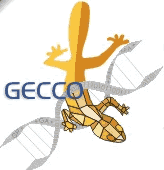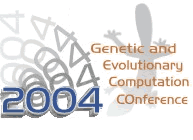

June 26 - 30, 2004
Saturday to Wednesday
Seattle, Washington, USA
Session: |
WORLDS - Regeneration and Learning in Developmental Systems |
Title: |
Development and complexity-based fitness function modifiers |
Authors: |
Per Kristian Lehre |
Abstract: |
Artificial Development is a promising approach to evolutionary design optimization inspired by biological development. However, there is still no consensus as to which problem classes this approach has a clear advantage over classical direct encodings. We attack this problem by introducing the concept of fitness function modifiers based on complexity. Our results indicate that using these modifiers, we are able to discriminate a developmental mapping from a direct encoding with respect to their efficiency at solving classes of problems defined by the fitness modifiers. |
HomeProgramSearchAuthor Index
SponsorsCommitteeContact Us
